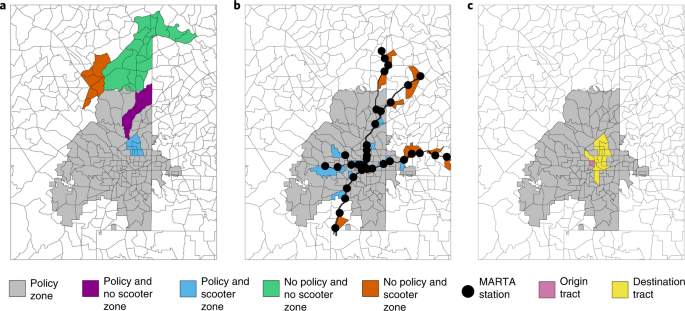2022-11-28 ジョージア工科大学
ジョージア工科大学の研究者であるOmar Asensioは、市内周辺の特定地域のUber Movementのデータを使って、禁止前後のユーザーの行動を比較した。
その結果、eスクーターやeバイクがなければ、人々は自家用車やライドシェアに頼ることになり、アトランタ市民の移動時間は毎年784,000時間増加することがわかりました。
アセンシオによると、「この余分な移動時間によって、ドライバーは何百万ドルもの時間的損失を被ることになります。禁止措置が日中に延長されれば、そのコストはさらに増大することは間違いないでしょう」。
メルセデス・ベンツ・スタジアムの大規模なスポーツイベントの前後では、移動時間の増加はさらに大きくなり、スクーター禁止令のためにドライバーの移動時間が37%(平均約12分)長くなったことを発見した。
この研究結果は、学術誌ネイチャーに掲載されました。
- https://www.gpb.org/news/2022/11/28/study-atlantas-e-scooter-ban-increased-travel-time
- https://www.nature.com/articles/s41560-022-01135-1
マイクロモビリティが自動車置換に与える影響(自然実験とジオフェンシング政策からのエビデンスを用いて。 Impacts of micromobility on car displacement with evidence from a natural experiment and geofencing policy
Omar Isaac Asensio, Camila Z. Apablaza, M. Cade Lawson, Edward W. Chen & Savannah J. Horner
Nature Energy volume 7, pages1100–1108 (2022)

Abstract
Micromobility, such as electric scooters and electric bikes—an estimated US$300 billion global market by 2030—will accelerate electrification efforts and fundamentally change urban mobility patterns. However, the impacts of micromobility adoption on traffic congestion and sustainability remain unclear. Here we leverage advances in mobile geofencing and high-resolution data to study the effects of a policy intervention, which unexpectedly banned the use of scooters during evening hours with remote shutdown, guaranteeing near perfect compliance. We test theories of habit discontinuity to provide statistical identification for whether micromobility users substitute scooters for cars. Evidence from a natural experiment in a major US city shows increases in travel time of 9–11% for daily commuting and 37% for large events. Given the growing popularity of restrictions on the use of micromobility devices globally, cities should expect to see trade-offs between micromobility restrictions designed to promote public safety and increased emissions associated with heightened congestion.



